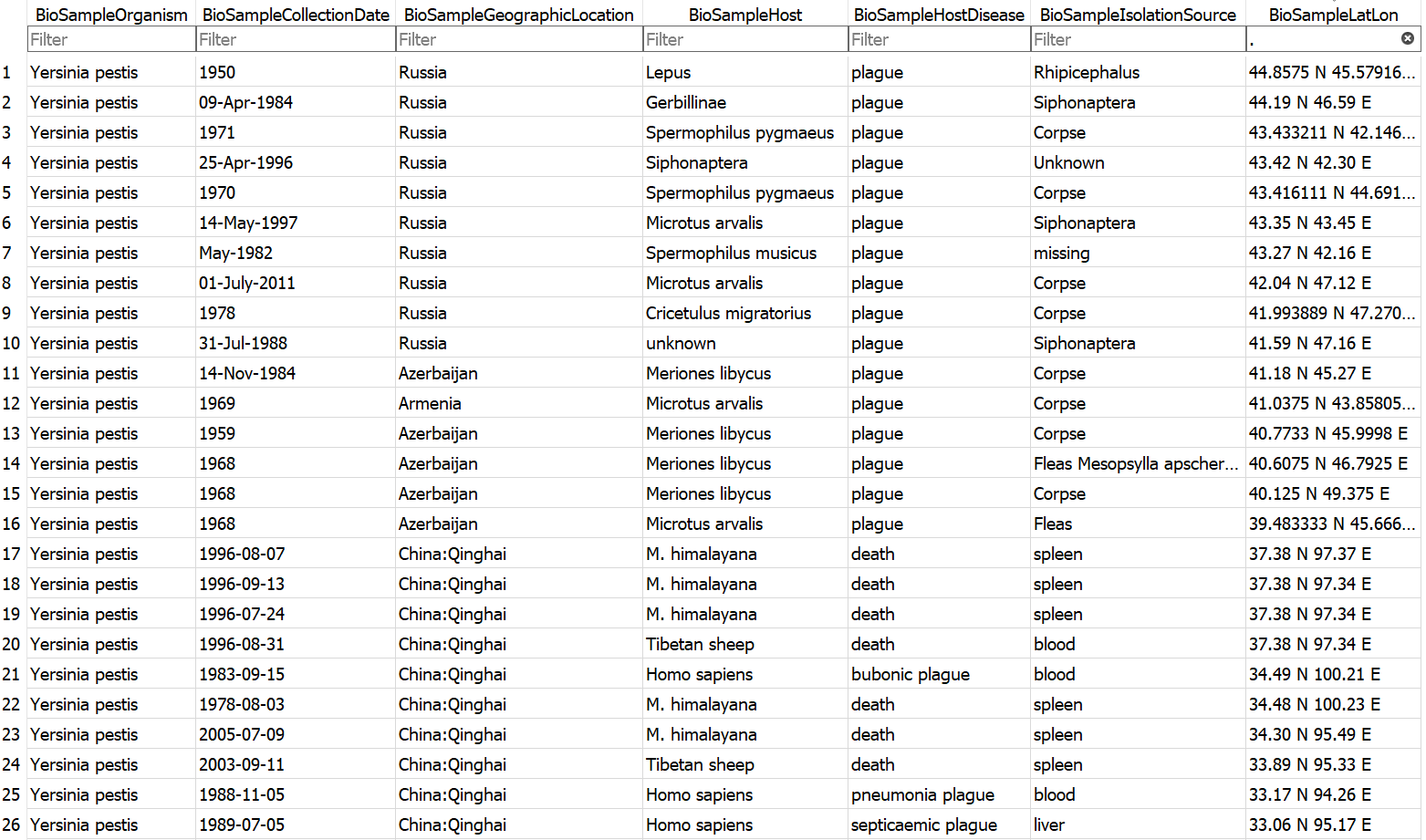Efficient and comprehensive metadata acquisition from NCBI databases (includes SRA).
Why NCBImeta?
NCBImeta is a command-line application that retrieves and organizes metadata from the National Centre for Biotechnology Information (NCBI). While the NCBI web browser experience allows filtered searches, the output does not facilitate inter-record comparison or bulk record retrieval. NCBImeta tackles this issue by creating a local database of NCBI metadata constructed by user-defined search criteria and customizable metadata columns. The output of NCBImeta, optionally a SQLite database or text files, can then be used by computational biologists for applications such as record filtering, project discovery, sample interpretation, or meta-analyses of published work.
Requirements
- NCBImeta is written in Python 3 and supported on Linux and macOS.
- Dependencies that will be installed are listed in requirements.txt.
- Python Versions:
- 3.7
- 3.8
- 3.9
- Operating Systems:
- Ubuntu
- macOS
Conda is the recommended installation method. To install with pip, gcc is required.
Installation
There are three installation options for NCBImeta:
1. Conda*
*
mambais strongly recommended overconda!
conda env create -f environment.yaml
conda activate ncbimeta
2. PyPI*
*
gccis required.
pip install ncbimeta
3. Github
git clone https://github.com/ktmeaton/NCBImeta.git
cd NCBImeta
pip install .
Test that the installation was successful:
NCBImeta --version
Command-Line Parameters
usage: NCBImeta [-h] --config CONFIGPATH [--flat] [--version]
[--email USEREMAIL] [--api USERAPI]
[--force-pause-seconds USERFORCEPAUSESECONDS]
NCBImeta: Efficient and comprehensive metadata retrieval from the NCBI
databases.
optional arguments:
-h, --help show this help message and exit
--config CONFIGPATH Path to the yaml configuration file (ex. config.yaml).
--flat Don't create sub-directories in output directory.
--version show program's version number and exit
--email USEREMAIL User email to override parameter in config file.
--api USERAPI User API key to override parameter in config file.
--force-pause-seconds USERFORCEPAUSESECONDS
FORCE PAUSE SECONDS to override parameter in config
file.
--quiet Suppress logging of each record to the console.
Quick Start Example
Access the quick start config file
Download the NCBImeta github repository to get access to the example configuration files:
git clone https://github.com/ktmeaton/NCBImeta.git
cd NCBImeta
Run the program
Download a selection of genomic metadata pertaining to the plague pathogen Yersinia pestis.
NCBImeta --flat --config test/test.yaml
(Note: The ‘quick’ start config file forces slow downloads to accommodate users with slow internet. For faster record retrieval, please see the config file docs to start editing config files.)
Example output of the command-line interface (v0.6.1):
Annotate the database with the user’s custom metadata
NCBImetaAnnotate \
--database test/test.sqlite \
--annotfile test/test_annot.txt \
--table BioSample
Note that the first column of your annotation file MUST be a column that is unique to each record. An Accession number or ID is highly recommended. The column headers in your annotation file must also exactly match the names of your columns in the database.
NCBImetaAnnotate by default replaces the existing annotation with the data in your custom metadata file. Alternatively, the flag --concatenate can be specified. This will concatenate your custom metadata with the pre-existing value in the database cell (separated by a semi-colon).
NCBImetaAnnotate \
--database test/test.sqlite \
--annotfile test/test_annot.txt \
--table BioSample \
--concatenate
Join NCBI tables into a unified master table
NCBImetaJoin \
--database test/test.sqlite \
--final Master \
--anchor BioSample \
--accessory "BioProject Assembly SRA Nucleotide" \
--unique "BioSampleAccession BioSampleAccessionSecondary BioSampleBioProjectAccession"
The rows of the output “Master” table will be from the anchor table “BioSample”, with additional columns added in from the accessory tables “BioProject”, “Assembly”, “SRA”, and “Nucleotide”. Unique accession numbers for BioSample (both primary and secondary) and BioProject allow this join to be unambiguous.
Export the database to tab-separated text files by table.
NCBImetaExport \
--database test/test.sqlite \
--outputdir test
Each table within the database will be exported to its own tab-separated .txt file in the specified output directory.
Explore!
- Explore your database text files using a spreadsheet viewer (Microsoft Excel, Google Sheets, etc.)
- Browse your SQLite database using DB Browser for SQLite (https://sqlitebrowser.org/)
- Use the columns with FTP links to download your data files of interest.
Example database output (a subset of the BioSample table)

Currently Supported NCBI Tables
- Assembly
- BioProject
- BioSample
- Nucleotide
- SRA
- Pubmed
Recent and Upcoming Features
- Project “Read The Docs”: Documentation Overhaul - PLANNED
- Project v0.8.3 - “Update Dependencies”: Bugfixes for Installation - RELEASED
- Project v0.8.2 - “Annotate Simplicity”: Simplify the Annotate Command - RELEASED
Documentation
To get started with customizing the search terms, database, and metadata fields, please read:
Issues, Questions, and Suggestions
Please submit your questions, suggestions, and bug reports to the Issue Tracker.
Please do not hesitate to post any manner of curiosity in the “Issues” tracker :) User-feedback and ideas are the most valuable resource for emerging software.
GitHub not your style? Join the NCBImeta Slack Group to see release alerts, chat with other users, and get insider perspective on development.
Contributing
Want to add features and fix bugs? Check out the Contributor’s Guide for suggestions on getting started.
Citation
Eaton, K. (2020). NCBImeta: efficient and comprehensive metadata retrieval from NCBI databases. Journal of Open Source Software, 5(46), 1990, https://doi.org/10.21105/joss.01990
Authors
Author: Katherine Eaton (ktmeaton@gmail.com)
Additional Contributors
Those who have filed issues, pull-requests, and participated in discussions.



